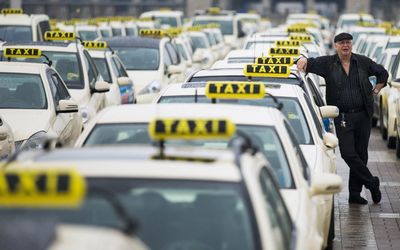Source:

Why Southeast Asia’s GrabTaxi is removing ‘taxi’ from its name
by Newley Purnell,
2016-01-28 17:46:32.0
UBER Technologies’s main rival in Southeast Asia wants people to know that it — like the San Francisco, California startup — offers not just taxis, but private cars.
Singapore-based GrabTaxi said on Thursday it was shortening its name to Grab. The goal: to highlight that in addition to allowing users to book taxis in 28 cities across Singapore, Indonesia, Malaysia, Thailand, the Philippines and Vietnam, it also offers newer services such as private cars — not to mention car pooling and even motorbike rides.
The re-branding comes as competition heats up for new users in the populous region. The US’s Lyft in December said it was teaming up with Grab and ANI Technologies’ Ola in India, to permit users of each app to hail rides from drivers of the other apps while traveling abroad.
That gives the alliance more leverage to compete against Uber, a global titan that has expanded its ride-sharing platform, which includes private cars and taxis in some markets, to more than 370 cities across 68 countries since launching in the US in 2010.
Uber’s valuation of some $51bn makes it the world’s most highly valued startup, according to The Wall Street Journal and Dow Jones VentureSource, giving it a vast war chest to hire not just engineers but a network of lawyers and lobbyists. Lyft is valued at $5.5bn, while Grab’s valuation stood at $1.6bn as of August.
Grab’s CEO, Anthony Tan, told The Wall Street Journal in an interview that the startup was changing its name because while many people had viewed it as "an app" in the past, "it’s not really just an app." The company is "really all the services when you think about transport," he said.
While Uber has faced regulatory scrutiny in the region and elsewhere, Mr Tan says his company makes a point of working closely with local policy makers and taxi drivers to ensure its services are legal.
A major challenge that Grab faces from Uber, a startup with much deeper pockets, is matching its engineering and design prowess. But Mr Tan said "it’s not just capital" that matters, and his firm is focused on providing safe and convenient services for its users.
Grab does not say how many users it has, but said on Thursday its app had been downloaded more than 11-million times, up from 4.8-million in June.
An Uber spokesman on Thursday said "millions of riders" use the platform daily across Southeast Asia.
More Africa news from The Wall Street Journal
More news from The Wall Street Journal
Premium access to WSJ.com: $1 a week for 12 weeks

Picture: REUTERS
UBER Technologies’s main rival in Southeast Asia wants people to know that it — like the San Francisco, California startup — offers not just taxis, but private cars.
Singapore-based GrabTaxi said on Thursday it was shortening its name to Grab. The goal: to highlight that in addition to allowing users to book taxis in 28 cities across Singapore, Indonesia, Malaysia, Thailand, the Philippines and Vietnam, it also offers newer services such as private cars — not to mention car pooling and even motorbike rides.
The re-branding comes as competition heats up for new users in the populous region. The US’s Lyft in December said it was teaming up with Grab and ANI Technologies’ Ola in India, to permit users of each app to hail rides from drivers of the other apps while traveling abroad.
That gives the alliance more leverage to compete against Uber, a global titan that has expanded its ride-sharing platform, which includes private cars and taxis in some markets, to more than 370 cities across 68 countries since launching in the US in 2010.
Uber’s valuation of some $51bn makes it the world’s most highly valued startup, according to The Wall Street Journal and Dow Jones VentureSource, giving it a vast war chest to hire not just engineers but a network of lawyers and lobbyists. Lyft is valued at $5.5bn, while Grab’s valuation stood at $1.6bn as of August.
Grab’s CEO, Anthony Tan, told The Wall Street Journal in an interview that the startup was changing its name because while many people had viewed it as "an app" in the past, "it’s not really just an app." The company is "really all the services when you think about transport," he said.
While Uber has faced regulatory scrutiny in the region and elsewhere, Mr Tan says his company makes a point of working closely with local policy makers and taxi drivers to ensure its services are legal.
A major challenge that Grab faces from Uber, a startup with much deeper pockets, is matching its engineering and design prowess. But Mr Tan said "it’s not just capital" that matters, and his firm is focused on providing safe and convenient services for its users.
Grab does not say how many users it has, but said on Thursday its app had been downloaded more than 11-million times, up from 4.8-million in June.
An Uber spokesman on Thursday said "millions of riders" use the platform daily across Southeast Asia.
More Africa news from The Wall Street Journal
More news from The Wall Street Journal
Premium access to WSJ.com: $1 a week for 12 weeks























Change: 0.16%
Change: 0.21%
Change: 0.68%
Change: 0.04%
Change: 0.07%
Data supplied by Profile Data
Change: -0.98%
Change: 0.79%
Change: 0.16%
Change: 0.00%
Change: 0.55%
Data supplied by Profile Data
Data supplied by Profile Data
Change: -0.21%
Change: 0.59%
Change: -0.07%
Change: 1.16%
Change: 0.73%
Data supplied by Profile Data